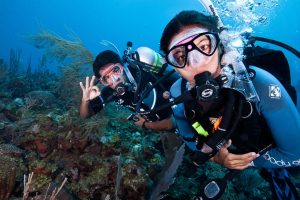

If you’re a person who is interested in finding adventure, discovering a new hobby, or viewing the world from a new perspective, training to become a scuba diver may be the answer. Scuba divers have the ability to explore areas that most people never get a chance to see. With 71 percent of the earth’s surface covered by ocean, divers will never run out of new areas to explore. What may come as a surprise to most however, is that scuba diving can have an impact on our dental health.
Diver’s Mouth is a collection of symptoms experienced by scuba divers that is related to the teeth and jaw. These symptoms include jaw pain, gum lacerations, broken fillings, headaches, tooth aches, loosened crowns, etc. and is caused by a variety of factors from pressure fluctuations in during a dive to the shape and size of the mouthpiece on the diver’s regulator and how tight the diver bites their mouthpiece.
Boyle’s Law and its role in Diver’s Mouth
When a dentist fills a tooth, sometimes small air pockets may remain within the filling if not filled carefully and correctly. Scuba divers often journey very deep into the water. Recreational divers can even go down to 130 feet. Pressure under water increases with depth and at these depths divers will experience a significant pressure difference from the surface. Boyle’s law is a scientific principle that says that the volume of gas is proportional to the pressure. So when there is more pressure the space the gas takes up is less. What this means for scuba divers with fillings is that if they happen to have any air pockets in their fillings, as they return to the surface these air pockets expand which can cause problems. Many scuba divers who experience diver’s mouth report symptoms like tooth aches, broken fillings, and a squeezing sensation in their teeth.
Before you go on a dive, it’s a good idea to visit your dentist office for a checkup. Let them know you’re planning a dive and ask if there are any concerns regarding your dental health that may affect your diving experience.